Edison undertakes to listen to the needs and expectations of each individual to encourage their professional growth and protect the health and safety of workers as much as possible.
EMPLOYEES BY GENDER
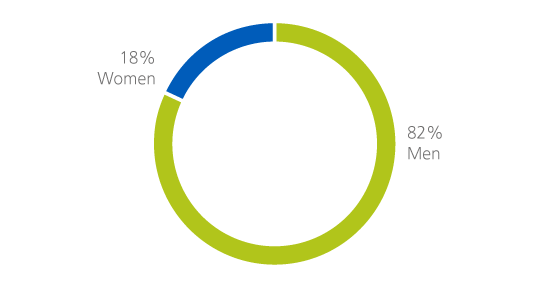
EMPLOYEES BY GEOGRAPHICAL AREA
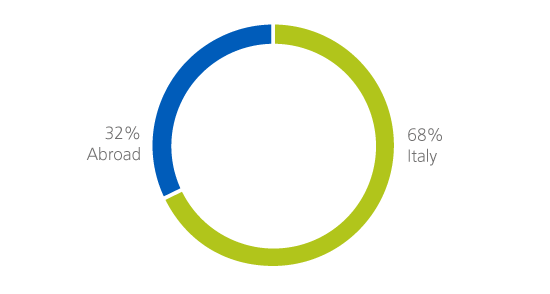
Encouraging people’s skills
In recent years, Edison has developed training programs to meet individual training needs and identify the specific competencies particular to the business. Its aim is to pave the way to growth with the recognition of the achievement of objectives and performance, in order to recognise talent of all kinds and strengthen technical-professional, managerial and transversal skills.
AVERAGE TRAINING HOURS
PER TRAINED EMPLOYEE
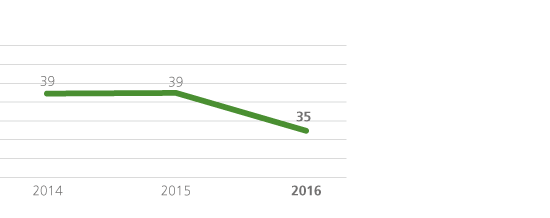
EMPLOYEES WHO RECEIVED AN
ANNUAL REVIEW (%)
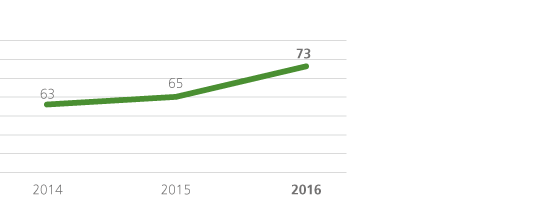
In 2016, Edison created a training plan of 125,205 hours, involving 3,626 people, equal to 73% of the company population, with expenditure of approximately €7.3 million, partly funded by the Fondimpresa and Fondirigenti interprofessional funds with a grant of €518 thousand for training. The average hours of training per trained employee in 2016 came to 35, slightly down on the previous year because of a reduction in the workforce and the activities at AQP’s Egyptian company in particular. The training program was developed to improve professional and technical training in line with the usual focus on safety and the environment. In 2016, institutional training courses were created for new hires and professionals. Furthermore, management of the talent management process continued.
Market academy activities for the various “professional families” and employees of third party companies providing the contact centre service also continued.
In addition, certain specialised training programs continued as well, including the “Nautilus” program on geosciences and subsoil for Exploration and Production personnel and Research and Development personnel. 2016 saw the start of an extensive program on the development of projects using “Agile”, a simplification and efficiency process for project management personnel in collaboration with CEFRIEL.
During the year, the Energy Business Specialisation course was launched in partnership with the Milan Polytechnic Business School (MIP), involving 28 professionals from different professional families within the Company. “Ecampusmanagers”, the manager training platform also made economic and innovation content available.
The collaboration between Edison’s training unit with EDF’s Corporate University, which gives high potential resources the chance to participate in international managerial training is still ongoing. In particular, Edison has collaborated in designing and providing the “Gas & Hydrocarbons Fundamentals” course with SDA Bocconi and the Group’s Corporate University.
Finally, for the first time, a women’s leadership development program was promoted for a group of women managers.
Young talent
Edison also guides and develops young talent, equipping them with tools to better face the labour market: it is involved in this area through a structured partnership with major Italian universities and business schools, as well as certain technical high schools, with which it has consolidated partnerships to enhance students’ school curriculum (for example, with information on sustainable professions - Green Job project). It also offers an orientation service to employees’ children involved in short-term training as part of the school/work project.
A specific policy to develop, train and recognise young talent helps safeguard the development of the community of young employees, i.e., during their first three to four years with the Company.
Edison believes it is important to cultivate talent and offer opportunities to people preparing to join the workforce too. Accordingly, it sponsors specialisation courses and master’s degrees: the Master in energy resource management, SAFE; the Master in Management and Technology of Energy, LUISS; the Master in Communications and Media Relations, Università Cattolica; the Master in Energy Management, MIP Polytechnic of Milan. Moreover, for the most deserving students, it funds colleges and institutions like the Milan College and the Engineering College of Turin. Partnerships continue with the Master’s degree in Green Management Energy and Corporate Social Responsibility, Università Bocconi and the RIDEF 2.0 Renewable Sources and Energy Efficiency Master’s at the Milan Polytechnic.
During the year, Incompany Training was held involving project work with Bocconi University’s top students on the related environmental training held on 18 January 2016. In June 2016, the fourth edition of Summer School with the Aquila University was held on energy transition and the digitalisation of the energy sector.
During the year, the Company ramped up its commitment to orientation for young people in their choice of education and work. Edison supports students completing their university and post-graduate studies in Environmental, Land and Infrastructure Engineering at the Turin Polytechnic who contribute to company research and development.
Structured listening as the basis for employee involvement
MyEDF is the annual survey in which all Edison workers express their opinions. It is the main reference used by the Company to steer and define actions for the involvement of employees and contractors.
Consisting of 80 questions, the survey has workers rate their satisfaction on various elements and the most critical aspects of their professional activities, working conditions and the management of day-to-day activities at the Company. The results of the survey enable Edison to structure and share specific work plans (company-wide/transversal plans and individual plans for each individual area) for the management of any critical issues that arise.
In 2016, the Fenice Group joined the Edison scope. It also participates in the MyEDF survey, although in a specific way.
The main findings of the 2016 survey, now in its fifth consecutive year, were shared with employees and constituted important input for the continuous improvement process in the management of Edison’s resources. Between September and October 2016, roughly 86% of Edison employees confirmed that they had received feedback on the results of the previous survey and about half said they were fully aware and/or involved in the action plans set forth. Fenice reported similar results as well.
In particular, through the 2016 survey, in which 80% of Edison employees and 81% of Fenice employees participated, the engagement index remained at high levels, confirming a good level of engagement overall.
For both Edison and Fenice, more than two-thirds of employees consider themselves fully committed, involved and in line with company strategies. The sense of belonging to their companies has remained at absolutely excellent levels: about 80% of employees would recommend that their friends join the company (78% for Edison and 85% for Fenice). Most employees also personally embrace the corporate values and culture and are proud to work there (87% for both companies).
Most Edison Group employees say they are absolutely satisfied with the overall services and welfare, health and accident-prevention coverage available. At Edison, in particular, 85% of employees now report their satisfaction in this area. Similarly, 94% of workers consider the services provided as part of the “Edison for you” program taken alone as useful.
In addition, 78% of Edison workers say that they are happy to go to work and, with respect to Edison’s many different initiatives, the perception of the Company’s focus on innovation continues to grow. Over 70% of workers believe that the expanded use of electronic tools for their work is positive.
Employees’ confidence in their direct supervisor and management of their organisational unit remained very high, with more than 70% of employees always reporting positive results in this category.
The survey naturally highlighted a few areas for improvement in order to make the most of diversity (age, gender and origin) within the company, awareness of professional opportunities available to employees and their satisfaction.
Edison will kick off projects to work on these and other corporate issues, along with transversal and common actions, again in 2017.
Industrial relations at Edison
Industrial relations in the Edison Group are founded on the principles of dialogue and preventive discussion with the trade unions and workers’ union representatives. Compliance with these values – now an integral part of the Edison Group - has enabled the Group to prevent situations of conflict from arising over the years and has encouraged the identification of solutions, including innovative solutions that reconcile the Company’s needs given the increasingly competitive context with the legitimate demands of workers.
The implementation of the new “Edison Group Representation System” signed in July 2015 continued in the year. After the election of new workers’ union representatives at all Edison Group sites in Italy in December 2015, the new members of the EDF Group’s European Work Council were appointed and participated in all the council’s work sessions. The trade unions are currently appointing the members of the new union body for the “Unitary Coordination of the workers’ union representatives” (i.e., the representatives elected by the workers). This will give rise to the definitive and complete implementation of the agreement on the Edison Group’s representation system.
In 2016, the sales of the Piombino and Milazzo production sites were finalised to entrepreneurs operating in the respective areas, ensuring the continuity of employment for all employees involved, as defined in specific understandings signed with the trade unions.
On 6 October 2016, an agreement was signed – between the institutions that set up the Fiprem Fund (“Fondo di Previdenza Complementare Montedison”, the complementary Montedison pension fund) – beginning the process of winding up the Fund. With the resolutions passed during the extraordinary shareholders’ meeting held on 21 December, the winding up process formally commenced on 1 January 2017. The decision to wind up the Fund was due to the need to ensure long-term sustainability and will be implemented with the priority of guaranteeing the maximum protection of fund participants’ individual positions.
At year end, the results/productivity bonuses for the electric, hydrocarbon and natural gas/water sectors were renewed for 2016 with the signing of another agreement for all the various sectors. This understanding introduced elements unifying the different sectors, such as a new profitability indicator that is the same for all group companies (EBITDA) except for companies subject to unbundling regulations. It also unified payment dates. Furthermore, the agreement contains the possibility of converting the amounts of bonuses into welfare services through another specific understanding to be signed within the first few months of 2017, which will govern how the amounts are converted.
During the year, Cellina Energy S.r.l. and a business unit made up of a few mini-hydroelectric power stations from the IDREG Piemonte bankruptcy joined the Edison Group, strengthening its presence in the hydroelectric sector. Discussion panels were held with the respective local trade organisations in view of these transactions - after having guaranteed the first stage of employee assignment - in order to decide how to align their salaries and benefits.
The sale of the Piombino site marked the successful completion of the re-employment of workers at power stations where operations were discontinued. This positive – and innovative – long-term process entailed the job placement of nearly 150 people.
Negotiations continued throughout 2016 to renew the main national labour agreements that apply to the Group. The metal-workers agreement was renewed at year end for Fenice’s Italian operations and the power sector and power/oil sector agreements were renewed in early 2017.
The importance of safety 1
Throughout all of 2016, Edison was involved in ensuring an ever greater protection of the health, safety and environment, not only for its employees working at the various company sites and offices, but also for the employees of third party contractors and its customers.
ACCIDENT FREQUENCY RATE
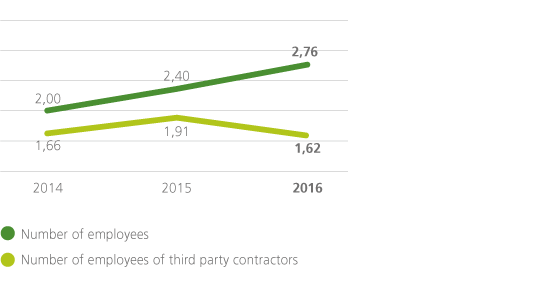
ACCIDENT SERIOUSNESS RATE
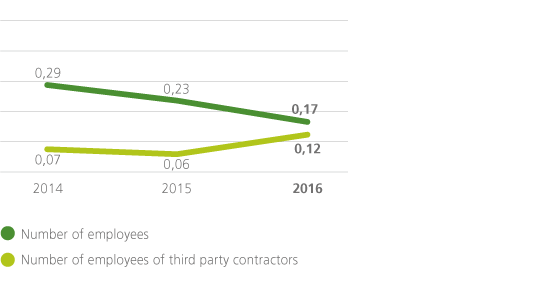
It completed activities to meet the requirements of current legislation with respect to updating the risk assessments and organising period safety meetings. These were opportunities to report back on the progress of training processes and the macro results of health monitoring.
During the year, all the inspections to monitor and/or renew certified management systems in accordance with UNI EN 14001 environmental standards, BSI OHSAS 18001 health and safety standards and UNI EN ISO 9001 quality standards were completed with positive results. In addition, where applicable, the scheduled audits were conducted to maintain EMAS environmental registration.
In February 2016, the overall review of the environment and safety management systems was carried out, in line with the organisational model and the specific 231 protocols. Objectives were set for the year and both the internal audit plan and the transversal training plan for the PASQ professional family were announced.
One of the significant commitments rolled out in 2016 is the launch of the PASQ Academy, which consists of workshops on specific issues supported by digitalisation tools. In particular, the first workshop was completed on the identification of guidelines for the implementation of the context analysis and approach to risks and opportunities in accordance with the new criteria dictated by UNI EN ISO 14001:2015 and UNI EN ISO 9001:2015.
Edison also participated in European Safety Week for the first time in 2016. The week was devoted to ageing actively: personnel received information and specific e-training as part of a larger training program funded by the Fondimpresa interprofessional fund. The various initiatives included two sessions of safe defensive driving on a special road set aside for employees in Edison’s commercial and technical areas.
The employees of third party contractors working continuously at Edison’s operating sites were involved in coordination meetings and training sessions on specific issues and on more generic health, safety and environmental issues, in order to reinforce their knowledge in these areas. Two of the main sites managed by the Engineering Division received recognition as part of special projects to reward suggestions for improving safety conditions.
As in previous years, Edison adoption of a global and integrated approach to managing the prevention and promotion of a culture of health and safety in the work place was consolidated, considering both Edison’s and suppliers’ personnel and assigning the entire management team objectives for the improvement of average results in the past three years.
EMPLOYEES OF THIRD PARTY CONTRACTORS PARTICIPATING IN HEALTH AND SAFETY TRAINING (%)
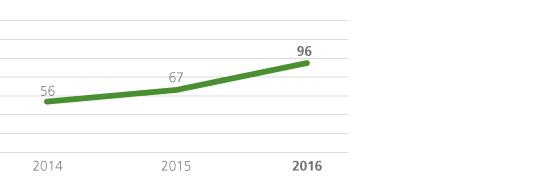
With the integration of Fenice into Edison, overall accident indicators were consolidated considering the entire year and, therefore from January 2016, and restating the comparative 2015 indicator. Accordingly, 2016 ended with a total accident frequency rate for activities in Italy and abroad that came to 1.96, an improvement on the year-end 2015 figure (2.1) which only considered Edison and not Fenice’s consolidated data. In detail, the frequency rate for company personnel was 1.62 (1.91 at year-end 2015) while for contractor personnel it was 2.76 (2.4 at year-end 2015) – the 2016 scope included Fenice operations for both.
The total seriousness rate was 0.14 in 2016, slightly up on 2015 (0.11).
1 2014 and 2015 data do not include Fenice operations. 2016 data include Fenice operations for all 12 months.
